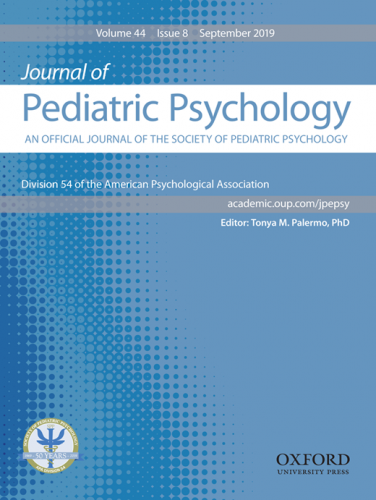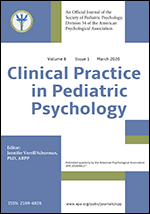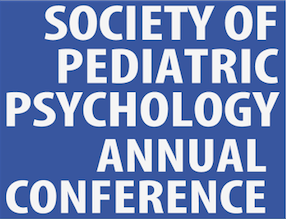Assessment Resource Sheet : Measures of Adherence to Medical Treatments
Methods of assessing treatment adherence include structured interviews, self-report questionnaires, and diary measures. We excluded electronic monitors, prescription refill histories, and biochemical assays because their measurement properties are beyond the scope of this resource sheet. This list of evidence-based measures was originally published in the Journal of Pediatric Psychology (Quittner et al., 2008). All measures are classified as well-established, approached well-established, and promising, the criteria for which are outlined in Quittner et al. Information on where to obtain these measures is included in the parenthesis after each measure. In addition, age ranges (when available) are included in parentheses. Central references are included after each table, with citations below. Note that adherence assessment often requires comparing a patient or parent’s self-reported adherence to their prescribed treatment plan (PTP), as defined by their healthcare provider. An example of a PTP.
Structured Interviews and Self-Report Measures of Adherence
| Assessments | Well-established | Approaching Well-established |
Promising |
| Diabetes | |||
| Self-Care Adherence Interview (SCAI)1, 2, 3 [Cindy L. Hanson, PhD – formerly at the University of Central Florida, Department of Psychology, Orlando, Fla. 32816] (ages 10-20) |
X | ||
| Self-Care Inventory(SCI) 4,5 (children and adolescents) | X | ||
| Diabetes Regimen Adherence Questionnaire (DRAQ)6, 7 [Martha Brownlee-Duffeck, PhD, Harry S Truman Veterans Hospital, 800 Hospital Drive Columbia, MO 65201] (ages 8-17) | X | ||
| Transplant | |||
| Behavioral Affective and Somatic Experiences (BASES): Compliance Scale8 [Sean Phipps, PhD, St. Jude Children's Research Hospital, 262 Danny Thomas Place, Memphis, TN 38105-3678] (parent version for children) |
X | ||
| Self-Regulation of Medication Adherence Battery (SRMAAB)9 [Carolyn M. Tucker PhD, Department of Psychology, P.O. Box 112250, University of Florida, Gainesville, FL 32611] (ages 6-20) |
X | ||
| Cystic Fibrosis | |||
| Disease Management Interview-CF (DMI-CF)* (formerly Treatment Adherence Questionnaire) 10 (ages 10 and above) |
X | ||
| Treatment Adherence Rating Scale* (TARS)11 [Carolyn E. Ievers-Landis, PhD, Division of Behavioral Pediatrics and Psychology, Rainbow Babies and Children's Hospital, 11100 Euclid Avenue, Cleveland, OH 44106-6038] (children and adolescents) | X | ||
| Asthma | |||
| Family Asthma Management System Scale (FAMSS)12, 13 [Mary D. Klinnert, PhD, Department of Pediatrics 1400 Jackson St. Denver, CO 80206] (ages 11-17) | X | ||
| Disease Management Interview-Asthma14 [Avani C Modi, PhD, Cincinnati Childrens' Hospital Medical Center, 3333 Burnet Ave. MLC 3015, Cincinnati, Ohio 45229] (ages 10 and above) | X | ||
*Note that the DMI-CF and TARS have been replaced by the Treatment Adherence Questionnaire-Revised (TAQ-R).
| Assessments | Well-established | Approaching Well-established |
Promising |
| HIV/AIDS | |||
| Pediatric AIDS Clinical Trials Group (PACTG): Adherence modules 15, 16 Email (ages 0-17) | X | ||
| Spina Bifida | |||
| Parent Report of Medical Adherence in Spina Bifida Scale (PROMASB)17 [available in appendix of original citation] (children and adolescents) |
X | ||
Diary Measures of Adherence
| Assessments | Well-established | Approaching Well-established |
Promising |
| 24-hr Recall18, 19, 20 [Suzanne Bennett Johnson PhD, Department of Medical Humanities and Social Sciences, Florida State University College of Medicine, 1115 West Call Street, FL 32306-4300 ] (ages 6-19) | X | ||
| Daily Phone Diary 21, 22 (children and adolescents) | X |
1. Hanson, C.L., Cigrang, J.A., Harris, M.A., Carle, D.L., Relyea, G., & Burghen, G.A. (1989). Coping styles in youths with insulin-dependent diabetes mellitus. Journal of Consulting and Clinical Psychology, 57(5), 644–651.
2. Hanson, C.L., Henggeler, S.W., Harris, M.A., Cigrang, J.A., Schinkel, A.M., Rodrigue, J.R., et al. (1992). Contributions of sibling relations to the adaptation of youths with insulin-dependent diabetes mellitus. Journal of Consulting and Clinical Psychology, 60(1), 104–112.
3. Hanson, C.L., De Guire, M.J., Schinkel, A.M., Kolterman, O.G., Goodman, J.P., & Buckingham, B.A. (1996). Self-care behaviors in insulin-dependent diabetes: Evaluative tools and their associations with glycemic control. Journal of Pediatric Psychology, 21(4), 467–482.
4. La Greca, A.M., Swales, T., Klemp, S., & Madigan, S. (1988). Self care behaviors among adolescents with diabetes. Proceedings of the 9th Annual Sessions of the Society of Behavioral Medicine, A42.
5. Greco, P., La Greca, A.M., Ireland, S., Wick, P., Freeman, C., Agramonte, R., et al. (1990). Assessing adherence in IDDM: A comparison of two methods. Diabetes Care, 40, 165.
6. Brownlee-Duffeck, M., Peterson, L., Simonds, J.F., Goldstein, D., Kilo, C., & Hoette, S. (1987). The role of health beliefs in the regimen adherence and metabolic control of adolescents and adults with diabetes mellitus. Journal of Consulting and Clinical Psychology, 55(2), 139–144.
7. Bond, G.G., Aiken, L.S., & Somerville, S.C. (1992). The health belief model and adolescents with insulindependent diabetes mellitus. Health Psychology, 11(3), 190–198.
8. Phipps, S., Hinds, P.S., Channell, S., & Bell, G.L. (1994). Measurement of behavioral, affective, and somatic responses to pediatric bone marrow transplantation: Development of the BASES scale. Journal of Pediatric Oncology Nursing, 11(3) 109–117.
9. Tucker, C.M., Petersen, S., Herman, K.C., Fennell, R.S., Bowling, B., Pedersen, T., & Josmik, J.R. (2001). Self-regulation predictors of medication adherence among ethnically different pediatric patients with renal transplants. Journal of Pediatric Psychology, 26, 455–464.
10. Quittner, A.L., Espelage, D.L., Ievers-Landis, C.E., & Drotar, D. (2000b). Measuring adherence to medical treatments in childhood chronic illness: Considering multiple methods and sources of information. Journal of Clinical Psychology in Medical Settings, 7, 41–54.
11. DeLambo, K.E., Ievers-Landis, C.E., Drotar, D., & Quittner, A.L. (2004). Association of observed family relationship quality and problem-solving skills with treatment adherence in older children and adolescents with cystic fibrosis. Journal of Pediatric Psychology, 29(5), 343–353.
12. Klinnert, M.D., McQuaid, E.L., & Gavin, L.A. (1997). Assessing the family asthma management system, Journal of Asthma, 34(1), 77–88.
13. McQuaid, E.L., Walders, N., Kopel, S.J., Fritz, G.K., & Klinnert, M.D. (2005). Pediatric asthma management in the family context: the family asthma management system scale. Journal of Pediatric Psychology, 30(6), 492–502.
14. Modi, A.C., & Quittner, A.L. (2006a). Barriers to treatment adherence for children with cystic fibrosis and asthma: What gets in the way? Journal of Pediatric Psychology, 31(8), 846–858.
15. Van Dyke, R.B., Lee, S., Johnson, G.M., Wiznia, A., Mohan, K., Stanley, K., et al. (2002). Reported adherence as a determinant of response to highly active antiretroviral therapy (HAART) in children who have human immunodeficiency virus infection. Pediatrics, 109(4), e61.
16. Farley, J., Hines, S., Musk, A., Ferrus, S., & Tepper, V. (2003). Assessment of adherence to antiviral therapy in HIV-infected children using the medication event monitoring system, pharmacy refill, provider assessment, caregiver self-report, and appointment keeping. Journal of Acquired Immune Deficiency Syndromes, 33, 211–218.
17. Holmbeck, G.N., Belvedere, M.C., Christensen, M., Czerwinski, A.M., Hommeyer, J.S., Johnson, S.Z., et al. (1998). Assessment of adherence with multiple informants in pre-adolescents with spina bifida: Initial development of a multidimensional, multitask parentreport questionnaire. Journal of Personality Assessment, 70(3), 427–440.
18. Johnson, S.B, Silverstein, J., Rosenbloom, A., Carter, R., and Cunningham, W. (1986). Assessing daily management in childhood diabetes. Health Psychology, 5(6), 545–564.
19. Naar-King, S., Frey, M., Harris, M., & Arfken, C. (2005). Measuring adherence to treatment of paediatric HIV/ AIDS. AIDS Care, 17(3), 345–349.
20. Marhefka, S.L., Tepper, V.J., Farley, J.J., Sleasman, J.W., & Mellins, C.A. (2006). Brief report: Assessing adherence to pediatric antiretroviral regimens using the 24-hour recall interview. Journal of Pediatric Psychology, 31(9), 989–994.
21. Quittner, A.L., & Opipari, L.C. (1994). Differential treatment of siblings: interview and diary analyses comparing two family contexts. Child Development, 65(3), 800–814.
22. Modi, A.C., & Quittner, A.L. (2006b). Utilizing computerized phone diary procedures to assess health behaviors in family and social contexts. Children’s Health Care, 35, 29–45.



